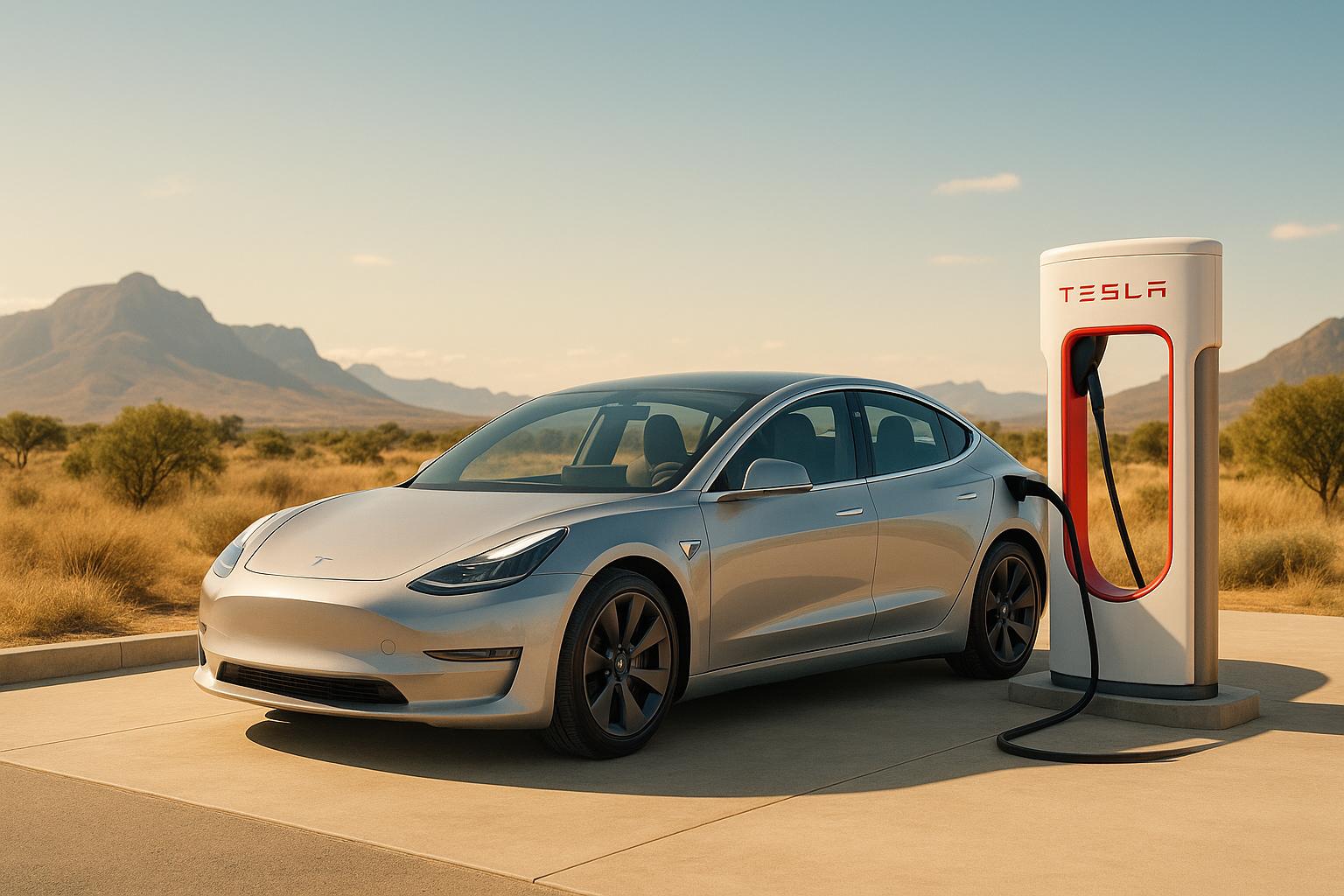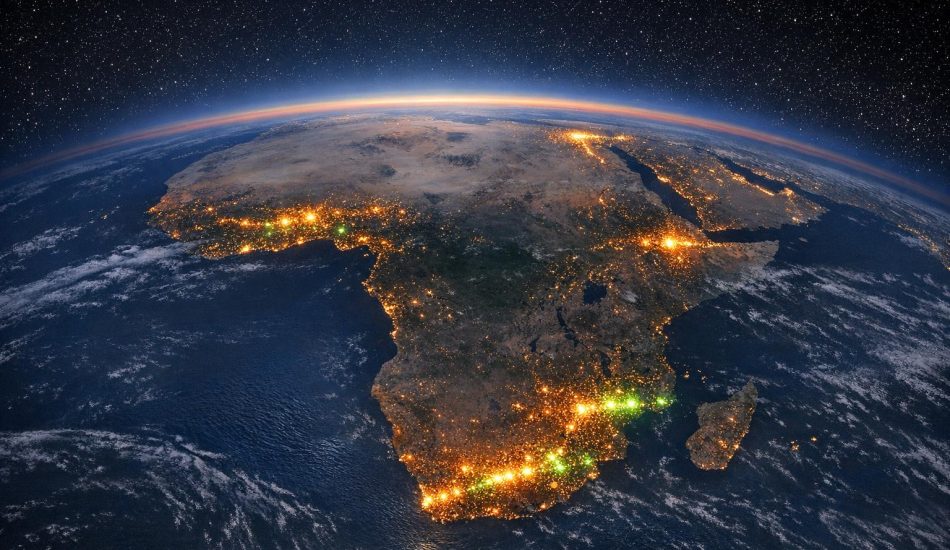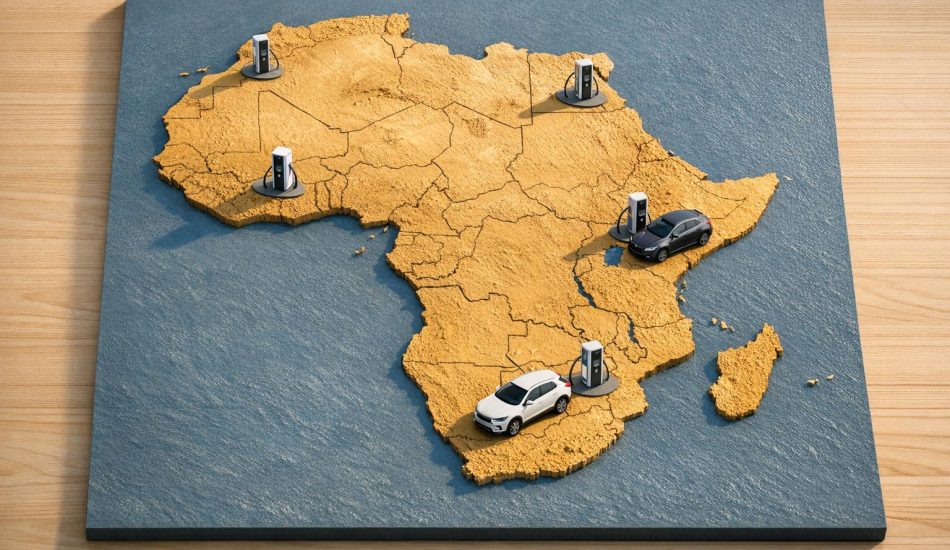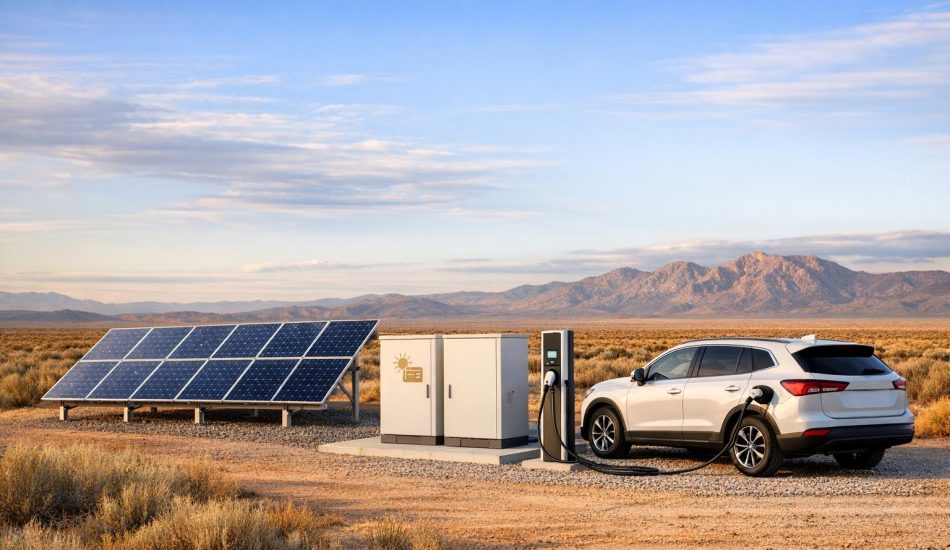
Thinking about buying a Tesla in South Africa in 2025? Here’s what you need to know:
- Tesla Models Available: Model 3 (sedan), Model Y (compact SUV), Model S Plaid (luxury sedan), and Model X (SUV with falcon wing doors).
- Price Factors: High import duties, shipping costs, and dealer markups make new Teslas expensive. Used models are more affordable but limited in availability.
- Charging Options: Home chargers (Level 2) are the most practical. Superchargers (Level 3) provide fast charging but are mainly in urban areas.
- Ownership Costs: Lower maintenance and charging costs compared to gas cars, but insurance and service access can be challenging.
- Buying Process: Teslas are imported through dealers like EV24.africa, which handles documentation, financing, and delivery.
Tesla’s advanced features, strong performance, and growing charging infrastructure make them appealing, but high upfront costs and limited local support remain obstacles. Platforms like EV24.africa simplify the process for buyers by offering verified listings, financing options, and import assistance.
Tesla Model X Review – We drive the only one in South Africa!
Tesla Models Available in South Africa (2025)
South African buyers can choose from three Tesla models, offered through importers and specialized dealers. Each model brings its own set of features and performance capabilities, catering to a variety of preferences in the growing electric vehicle (EV) market.
Tesla Model 3
The Tesla Model 3 is a sleek sedan designed with simplicity and functionality in mind. Its standout features include a 15-inch touchscreen interface, dual-motor all-wheel drive, standard Autopilot, and a spacious glass roof. For practicality, it offers storage in both a front trunk and rear cargo area, making it a versatile option for everyday use.
Tesla Model Y
Built on the Model 3 platform, the Tesla Model Y is a compact SUV that offers more space and flexibility. With a higher seating position and increased cargo capacity, it’s ideal for families or those needing extra room. It also comes with an optional third row to accommodate up to seven passengers, a panoramic glass roof, a power liftgate, and even an available tow hitch for added utility.
Tesla Model S Plaid and Model X
The Tesla Model S Plaid is all about performance. Equipped with a tri-motor powertrain, it delivers incredible acceleration and a luxurious interior featuring a large touchscreen, premium finishes, and heated and ventilated seats. On the other hand, the Tesla Model X stands out with its eye-catching falcon wing doors and spacious seating for up to seven. It also boasts impressive towing capabilities, blending practicality with style. Both models come with high-performance powertrains, advanced suspension systems, and a suite of driver assistance features.
These details provide a foundation for exploring Tesla’s pricing and performance in South Africa for 2025.
Tesla Car Prices in South Africa
Tesla vehicles in South Africa come with hefty price tags, influenced by import duties, taxes, and dealer markups. Here’s a closer look at what to expect when shopping for new or used Teslas in the country.
New Tesla Prices in 2025
If you’re eyeing a brand-new Tesla, be prepared for higher costs. These vehicles are subject to extra expenses like import duties, shipping fees, and local taxes, all of which significantly drive up the price. Dealers also add their own margins, further increasing the cost. For the most accurate and up-to-date pricing, it’s a good idea to consult local sources.
While new models are undeniably pricey, the used Tesla market offers a more budget-friendly way to own one of these premium electric cars.
Used Tesla Market Pricing
The used Tesla market in South Africa provides a more affordable entry point, though the selection remains relatively limited. Prices for pre-owned Teslas depend on factors like the model year, mileage, battery condition, and service history. Cars that are well-maintained and come with transferable warranties typically fetch higher prices. On the other hand, older models or those with noticeable battery wear tend to be more affordable.
If you’re considering buying a used Tesla, make sure to check service records and battery health reports carefully. Platforms like EV24.africa can be a helpful resource, connecting buyers with verified sellers and providing detailed listings that include import documentation and service histories to ensure a transparent purchasing process.
sbb-itb-99e19e3
Tesla EV Specs and Performance
As Tesla adapts to meet the needs of South African drivers, efficient charging remains a cornerstone of its performance and convenience. The brand’s charging system plays a vital role in maintaining its reputation for high performance and ease of use.
Charging Times and Compatibility
For Tesla owners in South Africa, understanding charging times and infrastructure compatibility is essential. Tesla vehicles offer a three-tiered charging system designed to accommodate both everyday driving and longer trips:
- Level 1 Charging: This option uses a standard household outlet, adding just 3–5 miles of range per hour. It’s best reserved for emergencies due to its slower speed.
- Level 2 Charging: Perfect for daily use, Level 2 charging with the Tesla Wall Connector significantly reduces charging time and ensures the vehicle is ready when needed.
- Level 3 Supercharging: Tesla’s Superchargers can recharge the battery from 10% to 80% in just 15–30 minutes, delivering up to 250 kW of power. Charging slows after 80% to help preserve the battery’s health.
These charging options not only enhance convenience but also support Tesla’s performance capabilities, paving the way for a closer look at driving range and power output.
Tesla vehicles are compatible with both the Tesla Wall Connector and select third-party chargers, offering flexibility for South African drivers. Since around 90% of EV charging typically happens at home or work, installing a Level 2 charger is one of the most practical solutions for local owners.
Buying a Tesla in South Africa: What You Need to Know
Purchasing a Tesla in South Africa isn’t as straightforward as walking into a dealership. Since Tesla doesn’t have an official presence in the country, owning one involves navigating import processes, understanding ownership costs, and weighing the pros and cons of electric vehicle (EV) ownership in the region. Here’s a breakdown of what to expect.
Import and Registration Process
Without Tesla dealerships in South Africa, most buyers rely on authorized dealers or import companies to bring their vehicles into the country. The process can take several weeks, depending on shipping schedules and customs clearance.
To import a Tesla, you’ll need an import permit, proof of duty payment, and compliance certificates to confirm the vehicle meets local safety and emissions standards. Once the car is in the country, registering it with local traffic authorities requires:
- The original certificate of compliance
- Proof of a roadworthy inspection
- Payment of registration fees, which vary by municipality
Insurance is another essential step. Many insurers now offer policies tailored for EVs, though premiums may be slightly higher due to the unique repair needs of electric vehicles. After completing import and registration, it’s important to consider the ongoing costs of ownership and any available incentives.
Ownership Costs and Incentives
Owning a Tesla in South Africa can be more affordable in the long run compared to traditional gas-powered cars. Charging costs are generally lower than fuel expenses, and maintenance is typically less demanding since EVs have fewer moving parts. However, accessing specialized service centers may be a challenge outside major cities.
Government incentives for EVs in South Africa remain limited. While some municipalities or business-related purchases may benefit from tax allowances or reduced licensing fees, there are no widespread purchase rebates or significant tax credits for individual buyers.
Tesla Ownership: Pros and Cons
Owning a Tesla comes with clear benefits, but there are also challenges to consider. Here’s a quick overview:
| Advantages | Disadvantages |
|---|---|
| Lower running costs: Charging costs are cheaper than gasoline. | High upfront cost: Import duties and taxes can make Teslas expensive. |
| Cutting-edge technology: Features like Autopilot and over-the-air updates set Teslas apart. | Limited service options: Repairs and maintenance may require trips to major cities. |
| Eco-friendly: Zero local emissions help reduce your carbon footprint. | Sparse charging infrastructure: Public charging stations are less common outside urban areas. |
| Strong performance: Instant torque delivers impressive acceleration. | Parts availability: Sourcing replacement parts can take time. |
| Resale value: Used Teslas often hold their value well. | Range concerns: Long trips may require careful planning for charging stops. |
For those looking to buy, platforms like EV24.africa make the process easier by offering transparent listings of new imports and locally available used models. Buyers can compare specs, pricing, and financing options all in one place.
When insuring your Tesla, look for policies that cover battery protection, charging equipment, and specialized towing. Some insurers even offer usage-based policies, which can save money if you mostly drive within city limits. Additionally, major banks now provide EV-specific loans. While interest rates on these loans may be slightly higher, extended repayment terms can help keep monthly payments manageable.
Tesla’s Future in South Africa’s EV Market
Tesla’s presence in South Africa’s electric vehicle (EV) market is steadily evolving as the country shifts its focus toward sustainable transportation. While the brand has yet to establish an official dealership network, growing consumer interest and improvements in charging infrastructure suggest a promising future. Here’s a closer look at what South African buyers should consider as Tesla’s role in the market develops.
Key Points for South African Buyers
Tesla models remain expensive due to import duties, shipping costs, and currency fluctuations, but the pre-owned market is providing more affordable options for those looking to transition to EVs.
Charging infrastructure is getting better. Cities like Johannesburg, Cape Town, and Durban now offer more reliable networks of charging stations, making Tesla ownership more practical for urban drivers. However, long road trips across provinces still require careful planning due to limited charging options in rural areas.
Service and financing are becoming more accessible. While Tesla lacks official service centers in South Africa, independent EV repair shops and mobile technicians are stepping in to fill the gap. Additionally, local banks are beginning to offer loans specifically designed for electric vehicles, though these loans may come with slightly higher interest rates compared to traditional car financing.
Platforms like EV24.africa simplify the buying process. By offering clear pricing, detailed vehicle specifications, and verified listings for both imported and used Teslas, this marketplace helps buyers navigate the complexities of importing a vehicle while ensuring proper documentation.
Together, these developments are making Tesla ownership more feasible for South Africans, setting the stage for the brand’s growing role in the country’s EV market.
Tesla and Future EV Adoption
Tesla’s influence in South Africa extends beyond its current sales. Known for its cutting-edge technology, the brand has played a significant role in raising awareness and acceptance of electric vehicles throughout the region.
The South African government is showing signs of increased support for EV adoption. Discussions around revising carbon taxes and reducing import duties could lead to better incentives for EV buyers in the future.
There’s also talk of local EV assembly, which could leverage South Africa’s well-established automotive industry to make electric vehicles more accessible and affordable.
At the same time, competition in the EV market is heating up. This growing rivalry might push Tesla to engage more directly with South African consumers, potentially through partnerships with authorized dealers or by investing in service centers.
The next few years will be pivotal in determining whether Tesla formalizes its presence with dedicated dealerships or continues to rely on imports. Either way, Tesla’s reputation for technological innovation and its strong brand appeal position it well to benefit from South Africa’s gradual shift toward electric mobility.
Meanwhile, ongoing investments in charging infrastructure – by both the government and private companies – are expected to address concerns about accessibility, making Tesla ownership more convenient for drivers across the country.
FAQs
What are the biggest challenges of owning a Tesla in South Africa, and how can they be addressed?
Owning a Tesla in South Africa isn’t without its hurdles. High import taxes, a limited charging network, and the overall expense of the vehicle – largely due to steep import duties – can make it a tough purchase for many.
However, there are ways to navigate these obstacles. Import assistance services can simplify the process and help cut down on costs. Setting up a home charging station is another practical solution to address the limited availability of public chargers. Looking ahead, changes in government policies or the introduction of incentives could potentially make electric vehicles more affordable and accessible in the country.
What charging options are available for Tesla owners in South Africa, and how is the infrastructure expected to improve by 2025?
South Africa’s electric vehicle (EV) charging network is growing at an impressive pace, with over 500 public charging stations already in place. These range from standard options to high-speed chargers, catering to the diverse needs of EV owners. Efforts are underway to expand this network further, with plans to add 127 more stations by March 2025, ensuring greater accessibility for drivers.
Tesla owners in South Africa can tap into the global Supercharger network, which provides fast and convenient charging along major travel routes. Looking ahead, the country is exploring solar-powered, off-grid charging stations and forging public-private partnerships to support the rising number of EV users. These advancements are set to make Tesla ownership in South Africa more convenient and environmentally friendly.
What costs and incentives should I consider when purchasing a Tesla in South Africa?
When buying a Tesla in South Africa, it’s important to factor in several additional costs. For starters, import duties add about 25% to the price, while VAT contributes another 15%. On top of that, there may be luxury taxes of up to 30%, depending on the car’s value. These taxes can substantially raise the total cost of the vehicle.
On the brighter side, South Africa has implemented measures to encourage the adoption of electric vehicles. These include buyer subsidies and tax incentives for manufacturers. However, it’s worth noting that federal tax credits for individual EV buyers will no longer be available after October 2025. Keep these factors in mind when planning your Tesla purchase.




